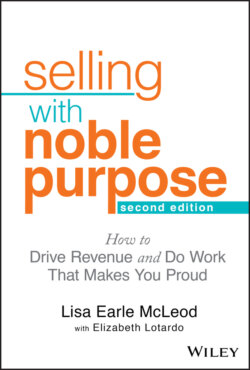Читать книгу Selling With Noble Purpose - McLeod Lisa Earle, Lisa Earle McLeod - Страница 20
Why Selling with Noble Purpose Becomes Self‐Reinforcing
ОглавлениеUnpack the inner drivers of most salespeople, and you'll find that money occupies a substantial part of their mental real estate. But people are complex; we have multiple motivations.
When we did a deep dive into the internal motivation of salespeople, we found the top performers do care about money. They're not complete altruistic do‐gooders. Many (myself included) initially got into sales because they wanted to make good money.
But here was the notable difference. Over time, the top performers added a layer of purpose. It often developed as a result of seeing their positive impact on customers. Because they were more attuned to it, they saw it more readily; it stuck and then became self‐reinforcing. It became their default.
For top performers, their internal talk track, the narrative in their heads that drives their daily behavior, is about the impact they have on customers. It doesn't matter what's going on inside their organization; their internal compass always resets back to the customer.
Mid‐level performers, on the other hand, tend to mirror the prevailing organizational story, whatever that may be. If the organization emphasizes a financial carrot‐and‐stick mentality, that's where their brains will go. If the organization has a narrative of a higher purpose, that's where their brains will go. The organizational talk track becomes their internal talk track.
When we do deep dives with salespeople who aren't top performers, we usually find that they too have a secret desire for purpose and meaning. They simply haven't reflected on it or spoken about it because nothing in their organization prompts them to think that way. It's not their default setting.
Their potential Noble Purpose is there, but it has yet to be activated. It's like a switch in the off position that needs someone else to turn it on. This book is about flipping that switch to on.
In his book Drive: The Surprising Secret About What Motivates Us, Daniel Pink writes, “The science shows that the secret to high performance isn't our biological drive or our reward‐and‐punishment drive, but our third drive—our deep‐seated desire to direct our own lives, to expand and extend our abilities, and to live a life of purpose.” Pink goes on to say, “Humans, by their nature, seek purpose—a cause greater and more enduring than themselves.”
The discord between what social science knows (humans crave purpose) and business does (the carrot and stick) creates a transactional relationship with both employees and customers.
Nowhere is this dissension greater than in sales, where organizations continue to dangle incentive programs, bonuses, and trips in front of salespeople, hoping that it will motivate them. Yet time and again, the incentive programs produce short‐term spikes in performance from a small percentage of people. In most organizations, the top performers remain the same year after year, while the rest of the sales force stays stuck in the mediocre middle.
What's ironic is that many organizations do make a difference to their customers, serving a larger purpose. They just don't talk about it with the salespeople.
We once worked with a security firm that was literally saving people's lives. The executive leaders made a regular practice of describing the meaningful impact their services had on customers to the tech team, the customer service group, and even the accountants.
Yet it was like they developed a sudden case of amnesia when they interacted with the sales department. All the discussions in sales meetings and coaching sessions were about quotas and revenue or product features and rollout plans. They almost never talked about the impact the services had on actual human beings.
This was a huge mistake.
The very people who should be on fire for making the difference to the customers—the sales force—almost never heard the purpose‐driven narrative. Talk about a mismatch.
Is it any wonder that their sales force struggled to maintain margins and was often treated like a commodity by their customers? If all you talk about is money and margin when you're inside the organization, it's only natural that's where things go in customer conversations.
Is it any surprise the company had high turnover in sales and their best people left for a competitor? The salespeople felt very little affiliation for their company, the leadership, or even the customers. It was never about anything but numbers, so when another company started offering the reps the promise of better numbers, they jumped at it.
Purpose drives higher sales numbers and strengthens your team's commitment to your firm and your customers. When your entire organization is focused on making a difference to customers, people are engaged more deeply. They're more likely to innovate because they know they're part of something important, something bigger than themselves.
An NSP solves the great sales disconnect. It combines making money with making a difference. It bridges the gap between internal conversation and external conversation.
